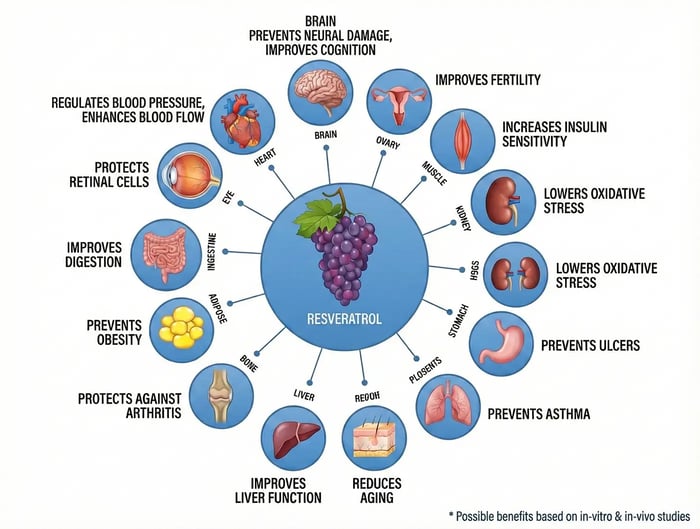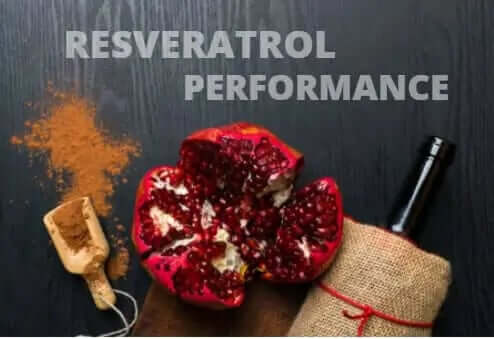Resveratrol: Revolutionary Scientific Breakthroughs Transform Health and Longevity Research
Resveratrol has emerged as one of the most promising natural compounds for health and longevity, with groundbreaking discoveries revealing its profound impact on cellular health. This powerful polyphenol, found naturally in red grapes, berries, and peanuts, continues to captivate researchers worldwide as they unlock its remarkable therapeutic potential.
Major Scientific Discovery Reveals How Resveratrol Works
The scientific community celebrated a pivotal moment when researchers finally identified the primary cellular target for resveratrol, solving a mystery that had puzzled scientists for years. This breakthrough, recognized by the prestigious journal Nature as one of the top scientific discoveries of 2012, fundamentally changed our understanding of how this natural compound delivers its impressive health benefits.
For decades, thousands of research papers documented the benefits of resveratrol supplementation, from cardiovascular protection to anti-aging effects. However, the precise mechanism remained elusive. This discovery revealed the crucial first step in the cascade of cellular events that resveratrol triggers, opening doors to targeted therapeutic applications.
Understanding the Sirtuin Connection
The breakthrough research demonstrated that resveratrol directly interacts with sirtuins, a family of proteins that regulate cellular health and longevity. These proteins act as cellular guardians, protecting against age-related damage and promoting healthy aging processes. When activated by resveratrol, sirtuins initiate a complex series of beneficial cellular responses that extend throughout the body.
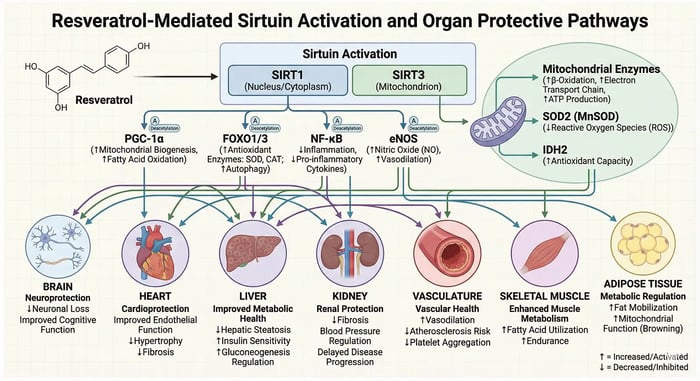
Resveratrol Shows Promise Against Viral-Induced Cancer
In another remarkable discovery, researchers found that resveratrol demonstrates powerful protective effects against virus-induced cancer transformation. This finding particularly relates to the Epstein-Barr virus (EBV), a member of the herpes virus family known to cause certain types of cancer.
The research revealed that resveratrol treatment significantly reduces the likelihood of normal B cells transforming into cancerous cells following EBV infection. This protective effect occurs through multiple mechanisms:
- Inhibition of viral proteins necessary for cellular transformation
- Selective targeting of already cancerous cells while preserving healthy cells
- Prevention of the malignant conversion process at the molecular level
- Support for the immune system's natural defense mechanisms
Clinical Implications for Cancer Prevention
This discovery holds tremendous significance given the widespread prevalence of herpes viral infections globally. The selective nature of resveratrol's action particularly impressed researchers, as it eliminated cancerous B cells while leaving normal, healthy B cells unharmed. This targeted approach suggests potential for developing safer, more effective cancer prevention strategies.
The Molecular Magic of Resveratrol
Resveratrol belongs to a class of compounds called stilbenes, which plants produce as a defense mechanism against stress, injury, and infection. Its unique molecular structure allows it to interact with multiple cellular pathways, making it exceptionally versatile in promoting health.
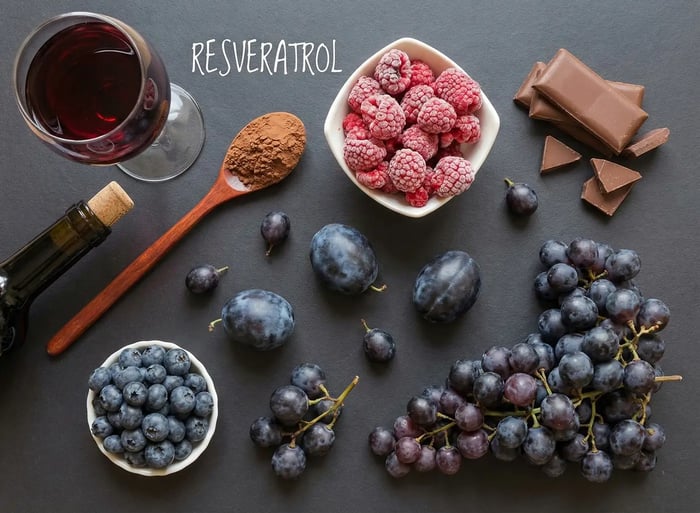
Key Health Benefits Supported by Research
Scientific studies have documented numerous health benefits associated with resveratrol supplementation:
- Cardiovascular Protection: Supports healthy blood pressure and cholesterol levels
- Anti-Aging Effects: Activates longevity genes and protects against cellular aging
- Brain Health: Crosses the blood-brain barrier to support cognitive function
- Metabolic Support: Enhances insulin sensitivity and metabolic efficiency
- Anti-Inflammatory Action: Reduces chronic inflammation throughout the body
- Antioxidant Properties: Neutralizes harmful free radicals and oxidative stress
Optimal Resveratrol Supplementation Strategies
Understanding how to maximize the benefits of resveratrol requires consideration of several factors. Research suggests that bioavailability plays a crucial role in determining effectiveness. Here are evidence-based strategies for optimal supplementation:
Dosage Considerations
Studies indicate that resveratrol dosages ranging from 150-500mg daily provide measurable health benefits. Higher doses may be appropriate for specific therapeutic applications under professional guidance. The compound's effects appear to be dose-dependent for certain benefits, while others show threshold effects.
Timing and Absorption
Taking resveratrol with meals containing healthy fats can enhance absorption. Morning supplementation may align better with the body's natural circadian rhythms, potentially maximizing the activation of longevity pathways. Some research suggests splitting doses throughout the day maintains more consistent blood levels.

Future Directions in Resveratrol Research
The identification of resveratrol's cellular targets opens exciting new avenues for research. Scientists are now exploring:
- Development of more bioavailable formulations
- Combination therapies with other natural compounds
- Targeted applications for specific age-related conditions
- Personalized supplementation based on genetic profiles
- Novel delivery methods for enhanced effectiveness
Emerging Applications
Recent studies suggest resveratrol may have applications beyond traditional health benefits. Researchers are investigating its potential in sports performance, wound healing, and even space medicine for protecting astronauts from radiation exposure.
Safety Profile and Considerations
Resveratrol demonstrates an excellent safety profile in human studies. Most people tolerate it well, even at higher doses. However, as with any supplement, certain considerations apply:
- May interact with blood-thinning medications
- Could affect estrogen-sensitive conditions
- Best avoided before surgery due to potential effects on blood clotting
- Consultation with healthcare providers recommended for those with existing conditions
Real-World Success Stories
Countless individuals have experienced transformative health improvements with resveratrol supplementation. From enhanced energy levels to improved cardiovascular markers, the real-world benefits align remarkably with scientific findings. Many report feeling more vibrant and youthful, with noticeable improvements in skin health, mental clarity, and overall vitality.
Quality Matters
Not all resveratrol supplements are created equal. Pure trans-resveratrol, the biologically active form, provides the most reliable benefits. Look for products that specify trans-resveratrol content and undergo third-party testing for purity and potency.
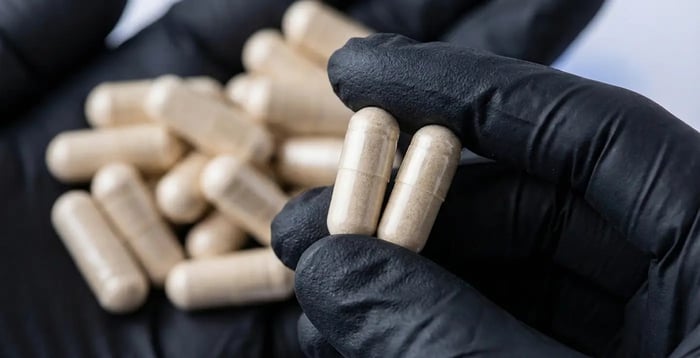
Integrating Resveratrol into a Healthy Lifestyle
While resveratrol offers impressive benefits, it works best as part of a comprehensive approach to health. Combining supplementation with a Mediterranean-style diet rich in colorful fruits and vegetables amplifies its effects. Regular exercise, stress management, and adequate sleep create an optimal environment for resveratrol to work its cellular magic.
The scientific breakthroughs surrounding resveratrol continue to validate what many cultures have known intuitively for centuries about the health benefits of certain foods and compounds. As research progresses, we gain deeper appreciation for this remarkable molecule's potential to enhance human health and longevity.
The journey of resveratrol from a simple plant compound to a scientifically validated health supplement exemplifies the power of natural medicine backed by rigorous research. With each new discovery, we move closer to unlocking the full potential of this extraordinary molecule for promoting vibrant health and extending healthy lifespan.
Frequently Asked Questions About Resveratrol
What makes resveratrol different from other antioxidants?
Resveratrol stands apart from other antioxidants due to its unique ability to activate sirtuins, the longevity proteins that regulate cellular health and aging. Unlike simple antioxidants that only neutralize free radicals, resveratrol triggers complex cellular pathways that promote DNA repair, enhance mitochondrial function, and support healthy gene expression. This multi-faceted action makes it particularly powerful for promoting longevity and preventing age-related diseases.
How quickly can I expect to see results from resveratrol supplementation?
The timeline for experiencing benefits from resveratrol varies depending on individual factors and health goals. Some people report increased energy and mental clarity within the first few weeks. Cardiovascular benefits typically become measurable after 4-8 weeks of consistent supplementation. For anti-aging effects and cellular protection, studies suggest that long-term supplementation of 3-6 months provides the most significant benefits. Remember that resveratrol works at the cellular level, so patience and consistency yield the best results.
Can I get enough resveratrol from food alone?
While foods like red grapes, blueberries, and peanuts contain resveratrol, obtaining therapeutic doses through diet alone proves challenging. For example, you would need to consume hundreds of glasses of red wine or pounds of grapes daily to match the resveratrol levels used in clinical studies. Supplementation provides a practical way to achieve beneficial doses without excessive calorie intake. However, including resveratrol-rich foods in your diet offers additional nutrients and compounds that work synergistically with supplemental resveratrol.
Is resveratrol safe for long-term use?
Research indicates that resveratrol is safe for long-term supplementation when used at recommended doses. Multiple human studies lasting several months to years have shown no significant adverse effects. In fact, long-term use appears to provide cumulative benefits for cellular health and aging. The compound has been consumed in small amounts through dietary sources for thousands of years. Always choose high-quality supplements and consult with healthcare providers if you have specific health conditions or take medications.
What is the best form of resveratrol to take?
Trans-resveratrol represents the most bioactive and well-studied form of resveratrol. Look for supplements that specifically state "trans-resveratrol" content rather than generic "resveratrol complex." Micronized formulations enhance absorption, while some products combine resveratrol with compounds like piperine or quercetin to improve bioavailability. Liposomal delivery systems show promise for maximizing cellular uptake. Choose products from reputable manufacturers that provide third-party testing results.
Can resveratrol help with weight management?
Resveratrol shows promising effects for supporting healthy weight management through multiple mechanisms. It helps activate AMPK, often called the "metabolic master switch," which enhances fat burning and improves insulin sensitivity. Studies indicate that resveratrol can help reduce fat accumulation, particularly dangerous visceral fat. It also supports healthy mitochondrial function, boosting cellular energy production and metabolic rate. Combined with a balanced diet and regular exercise, resveratrol serves as a valuable tool for achieving and maintaining optimal body composition.
How does resveratrol support brain health?
Resveratrol demonstrates remarkable neuroprotective properties by crossing the blood-brain barrier and directly supporting brain cells. It helps reduce neuroinflammation, protects against oxidative stress, and promotes the growth of new brain cells through increased BDNF (brain-derived neurotrophic factor) production. Research suggests resveratrol may help maintain cognitive function during aging, improve memory and focus, and potentially reduce the risk of neurodegenerative conditions. Its ability to enhance cerebral blood flow further supports optimal brain performance.
What role does resveratrol play in heart health?
Resveratrol provides comprehensive cardiovascular protection through multiple pathways. It helps maintain healthy blood pressure by supporting nitric oxide production, which relaxes blood vessels. The compound also promotes healthy cholesterol levels by reducing LDL oxidation and supporting HDL function. Additionally, resveratrol's anti-inflammatory properties help protect arterial walls from damage, while its antioxidant effects combat oxidative stress in cardiac tissues. These combined actions make resveratrol a powerful ally for maintaining heart health throughout life.
Can athletes benefit from resveratrol supplementation?
Athletes and active individuals can experience significant benefits from resveratrol supplementation. Research shows it enhances mitochondrial efficiency, improving endurance and reducing fatigue. The compound's anti-inflammatory properties help speed recovery between training sessions, while its antioxidant effects protect against exercise-induced oxidative stress. Some studies suggest resveratrol may improve VO2 max and overall athletic performance. Its ability to support healthy blood flow also benefits muscle oxygenation during intense physical activity.
How does resveratrol interact with other supplements?
Resveratrol generally works well with other supplements and may enhance their effects. It shows synergistic benefits when combined with other polyphenols like quercetin or curcumin. Pairing resveratrol with NAD+ precursors like NMN or NR may amplify anti-aging effects. Omega-3 fatty acids can improve resveratrol absorption while providing complementary cardiovascular benefits. However, avoid taking resveratrol with iron supplements as it may interfere with iron absorption. Always space supplement intake appropriately and consult healthcare providers about potential interactions with medications.

